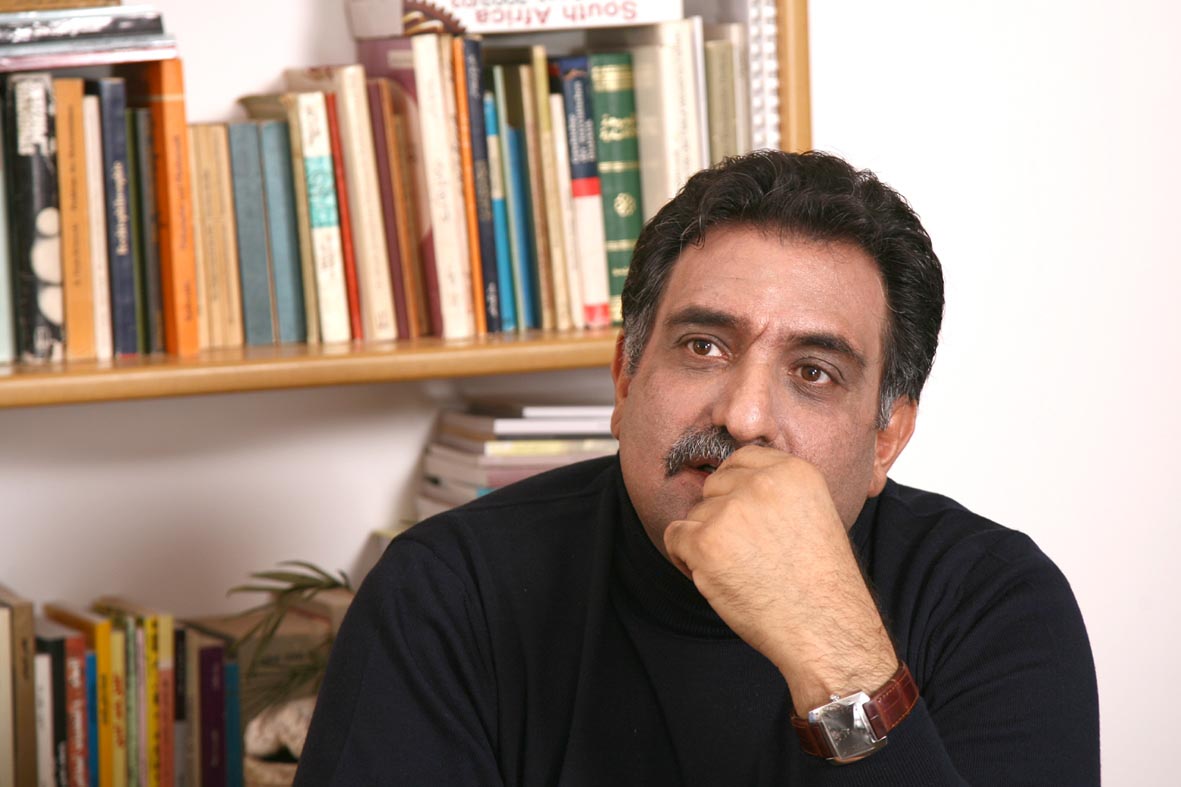BISHARA, AZMI (1956-)
Born in Kafr Rama, Galilee, on 22 July 1956 to a Christian family; grew up (and still lives in Nazareth); in 1974, founded the National Committee of Arab Secondary School Students; as a university student, co-founded the Arab Students’ Union; active in the establishment of the students committee and Arab campus organizations at Haifa University and the Hebrew University in Jerusalem, as well as in the Committee for the Protection of Lands (established in 1976) and against the Israeli occupation of the territories; received a PhD in Philosophy from Humboldt University, East Berlin, in 1986; taught at Birzeit University for ten years and headed its Philosophy and Cultural Studies Dept. from 1990-92; co-founder of Muwatin - The Palestinian Institute for the Research of Democracy in Ramallah; co-founder (together with Israeli colleagues) of the social sciences journal Theory and Criticism; has also worked as a senior researcher at the Van Leer Institute in Jerusalem; became a member of the New Communist List (Rakah) but left the party and helped establishing the Democratic National Assembly – Brit Leumi Democratit (Balad); was elected to the Knesset in May 1996, representing Balad; in 1999, was the first Israeli-Arab ever to run for PM but eventually withdrew his candidacy before the elections; on 7 Nov. 2001, the Knesset voted to lift his immunity as MK in order to initiate criminal prosecution, charging him for ‘incitement’ in connection with speeches he made in Umm Al-Fahm (June 2000) and Syria (June 2001), expressing support for the right to resist the Israeli occupation of the Palestinian territories and South Lebanon (marking the first ever time that an MK has been stripped of his immunity because of political statements); was elected to the 16th Knesset in Jan. 2003; on 1 April 2003, the Nazareth Magistrate Court dismissed the indictment filed against him in connection with the Syrian visits case; has written extensively on democracy, civil society, Palestine and Middle East politics; was re-elected to the 17th Knesset in March 2006 and serves as Member of the Constitution, Law and Justice Committee.

بشارة، عزمي (1956 - ) من مواليد كفر الرامة في الجليل عام 1956؛ نشأ وترعرع في الناصرة؛ أسس في عام 1974 لجنة الثانويات القطرية للطلاب العرب؛ أحد مؤسسي اتحاد الطلاب العرب؛ ناشط في تأسيس لجان الطلبة في جامعة حيفا والجامعة العبرية بالقدس، وناشط في لجنة حماية الأراضي (التي تأسست عام 1976) في معارضة الاحتلال العسكري الإسرائيلي؛ حاصل على شهادة الدكتوراه في الفلسفة والعلوم السياسية من جامعة هبولدت Humboldt University في برلين الشرقية عام 1986؛ عمل محاضراً في جامعة بيرزيت لمدة عشرة سنوات وكان رئيساً لدائرة الفلسفة والدراسات الثقافية فيها لمدة عامين (1990 - 1992)؛ أسس مع زملاء فلسطينيين آخرين المؤسسة الفلسطينية لدراسة الديمقراطية (مواطن) في رام الله إضافة إلى تأسيسه (مع بعض زملاء إسرائيليين) مجلة مختصة بقضايا نقدية فكرية اجتماعية؛ عمل أيضاً كباحث رئيسي في مؤسسة فان لير بالقدس في الأعوام 1990 - 1996؛ أصبح عضواً في القائمة الشيوعية الجديدة (راكاخ) ولكنه ترك الحزب ليساهم في تأسيس الجمعية الوطنية الديمقراطية - بريت ليئومي (حركة أبناء البلد)؛ انتخب في الكنيست في أيار/مايو عام 1996 ممثلاً حركة “أبناء البلد”؛ أول عربي داخل الخط الأخضر يرشح نفسه لمنصب رئيس الوزراء الإسرائيلي عام 1999 ولكنه سحب ترشيحه قبل موعد الانتخابات؛ في 7 تشرين الثاني نوفمبر 2001 صوّت الكنيست على إزالة حصانته الدبلوماسية كعضو كنيست وذلك للبدء بمقاضاته الجنائية بتهمة “التحريض” وتحديداً لخطاباته التي ألقاها في أم الفحم (في حزيران/يونيو 2000) وسوريا (حزيران/يونيو 2001) معبّراً عن دعمه لمقاومة الاحتلال الإسرائيلي للأراضي الفلسطينية وجنوب لبنان (وكانت أول مرة يتم فيها تجريد عضو كنيست من حصانته بسبب تصريحاته السياسية)؛ في 1 نيسان/إبريل 2003، قامت محكمة الناصرة بإسقاط الدعوى المرفوعة ضده فيما يتعلق بزياراته إلى سوريا؛ كتب بشكل مكثف حول قضايا الديمقراطية والمجتمع المدني والصراع الفلسطيني-الإسرائيلي وقدم تحليلات غنية حول الوضع في المنطقة؛ استقال من من الكنيست الإسرائيلي عام 2007؛ آثر البقاء خارج الوطن حتى لا يتم اعتقاله وسجنه بتهم إسرائيلية حول اتصالاته مع سوريا وحزب الله في لبنان.
